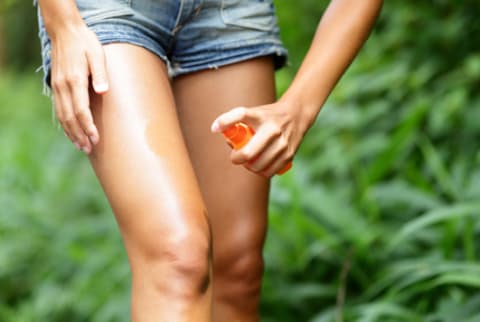Advertisement


U.S. public health officials have issued a grim new warning—mosquitoes of the type that transmit the deadly Zika virus are present in about 30 states across the nation—not 12 as originally thought.
As the Zika crisis widens, EWG's advice to Americans, especially to women who are pregnant or may become pregnant, is this: Cover up, pay careful attention to the CDC's Zika travel warnings, and use bug repellents most likely to drive away Aedes species mosquitoes, suspected to be the primary carriers of the Zika virus.
However, beware of marketing claims that promise 100 percent protection. No bug repellent or chemical-infused clothing can credibly guarantee to fend off all mosquitoes, but some repellents are better than others.
In a new analysis, EWG scientists have ranked repellents in order of effectiveness:
Most effective
In laboratory conditions, these repellents offer strong protection from the Aedes mosquito for at least four hours. It's important to reapply after swimming and sweating.
- DEET (20 to 30 percent concentration)
- Picaridin (20 percent concentration)
- IR 3535 (20 percent concentration)
Less effective
- Oil of lemon eucalyptus
Not effective
- Vitamin B1 patches
- Essential oils
Some essential oils may work for short periods of time, but others are ineffective against Aedes mosquitoes. Due to the serious risks posed by Zika, EWG does not recommend blends of essential oils for people at risk of mosquito-borne infection.
Studies show that ingredients in sunscreen increase your skin's capacity to absorb repellent.
If you're pregnant
The clear and present danger of the Zika virus has irrevocably altered how pregnant women must think about insect repellents. The benefits of repellents outweigh any potential safety concerns they may pose.
Look out for synthetic repellents approved by the U.S. Environmental Protection Agency1, and follow label instructions closely. Make sure to use these repellents as directed, but don't over-apply. Here are the details about a few we recommend using:
DEET
DEET is the only insect repellent that has been tested on pregnant women. These studies involved 897 women who applied DEET daily during their second and third trimesters. At age 1, the children of these mothers showed no birth defects, changes in body size, or developmental problems.
No studies have examined the children of women who applied DEET during the first trimester.
Many laboratory studies expose test animals to intense doses of chemicals to detect subtle or rare outcomes. The EPA approved DEET and other insect repellent chemicals after tests on pregnant animals in laboratory studies did not find any pregnancy-specific health risks, except at doses so high that they were toxic to the adult animals.
Always handle DEET with caution. It irritates the eyes and in intense doses may induce neurological damage. In very rare cases it has been reported to impair the nervous system, with symptoms including seizures, tremors, and slurred speech, most often after exposure to high concentrations. Infants and children may be more sensitive to these rare neurological side effects.
Picaridin
Picaridin has not raised as many concerns about neurotoxicity as DEET, but it has not undergone as much testing. The EWG's assessment is that it is a good alternative, with many of the same advantages and without the disadvantages of DEET.
The EPA says that picaridin has not induced developmental problems in the offspring of animals exposed to it; it harmed young animals only when their mothers had been exposed to doses so high they were toxic.
IR3535
IR3535 is also a good DEET alternative, with many of the same advantages and fewer disadvantages. Products using IR3535 at a concentration of 20 percent performed much like DEET, but products with lower concentrations were not as effective.
In animal tests, IR3535 harmed young animals only when the mothers were exposed to toxic levels of the chemical. IR3535 has not been tested for effects on human pregnancies.
Oil of lemon eucalyptus/PMD
Oil of lemon eucalyptus and PMD have not been thoroughly tested for their effects on children under 3 years old. The EWG advises against using them on pregnant and nursing women, babies, and toddlers. They are also less effective than other chemicals against Aedes mosquitoes that transmit the Zika virus.
Permethrin
Permethrin is sometimes embedded in textiles for mosquito control. Unlike other repellents, it acts on the insects' nervous systems. Laboratory studies confirm that this chemical can also affect the human nervous system and impair a child's developing brain. As with bug repellent lotions, you should assume that some amount of permethrin will rub off your child's clothing and penetrate her skin, but the EPA's safety investigations have found that permethrin-treated clothing present low risks to human health.
When infused into clothing, permethrin can deter mosquitoes from landing and prevent bites. However, CDC officials said that recent tests in Puerto Rico indicated that permethrin "probably isn't effective" in the current pandemic, so they dropped a plan to distribute permethrin-treated clothing. The chemical's effectiveness declines after washing. If you want to try it, buy clothing pre-treated at the factory. Don't treat your own clothing with liquid permethrin.
Clothing and sun protection
Clothing is the first choice for both sun and mosquito protection. Make sure that the material is sturdy to prevent bites. If you need both sun and mosquito protection, the CDC recommends buying two separate products and applying sunscreen first and then mosquito repellent. Studies show that ingredients in sunscreen increase your skin's capacity to absorb repellent.